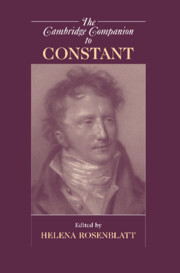Book contents
- Frontmatter
- Introduction
- 1 Benjamin Constant: Life and Work
- Part I The Political Thinker and Actor
- Part II The Psychologist and Critic
- 8 Constant and Women
- 9 Individualism and Individuality in Constant
- 10 Literature and Politics in Constant
- 11 The Theory of the Perfectibility of the Human Race
- Part III The Analyst and Historian of Religion
- Conclusion
- 15 Eclipses and Revivals Constant’s: Reception in France and America 1830-2007
- Bibliography
- Index
- Series List
11 - The Theory of the Perfectibility of the Human Race
from Part II - The Psychologist and Critic
Published online by Cambridge University Press: 28 July 2009
- Frontmatter
- Introduction
- 1 Benjamin Constant: Life and Work
- Part I The Political Thinker and Actor
- Part II The Psychologist and Critic
- 8 Constant and Women
- 9 Individualism and Individuality in Constant
- 10 Literature and Politics in Constant
- 11 The Theory of the Perfectibility of the Human Race
- Part III The Analyst and Historian of Religion
- Conclusion
- 15 Eclipses and Revivals Constant’s: Reception in France and America 1830-2007
- Bibliography
- Index
- Series List
Summary
De la perfectibilitée de l'espèce humaine is the title of the seventeenth chapter of Mélanges de littérature et de politique, which Constant published in 1829. For this work he chose what he judged to be pieces most representative of his thinking. In order to afford readers an overview of his vast and relatively scattered writing, he scoured his papers and previously published articles for items he particularly valued. Another reason for bringing the volume out in 1829 was that the author was a candidate for the Académie Française and hoped that it would add luster to his reputation as a writer. De la perfectibilité was the revised version of a text written twenty-five years earlier, and in it Constant reverted to a subject that might have seemed rather out of date by the time it was published. To be sure, the nineteenth century celebrated the triumph of progress even more than the eighteenth had done, and soon Marx’s historical materialism and Comte’s positivism would provide the notion with theoretical underpinnings. Yet “perfectibility” had fallen out of favor. Both the word and the idea smacked too much of tiresome Enlightenment debates at a time when the younger generation was drawn to the new values of militant Romanticism. Still, Constant was by no means a writer of the past forgotten by the young. At his funeral in December 1830 students turned out to demonstrate their sincere devotion to Constant, the tireless defender of freedom.
- Type
- Chapter
- Information
- The Cambridge Companion to Constant , pp. 248 - 272Publisher: Cambridge University PressPrint publication year: 2009
- 3
- Cited by

